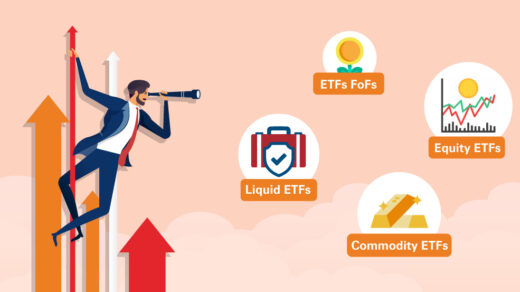Exchange-Traded Funds (ETFs) have emerged as a popular investment vehicle, providing investors with exposure to a diversified portfolio while being traded on an exchange, much like ordinary shares.
These financial instruments track the performance of specific indices or a basket of assets, offering a versatile and regulated investment option for individuals and institutions alike.
Types of Exchange-Traded Funds:
- Index ETFs:
- These ETFs replicate the performance of a specific index, whether it be stocks, bonds, commodities, or currencies. They achieve this by holding either the exact contents of the index or a representative sample of its securities.
- Bond ETFs:
- Bond ETFs invest in bonds and thrive during economic recessions when investors shift from the stock market to bonds, especially those issued by financially stable entities like government treasury bonds.
- Commodity ETFs (ETCs):
- These ETFs invest in commodities such as precious metals, agricultural products, and hydrocarbons, providing investors with exposure to the diverse world of commodities.
- Stock ETFs:
- The first and most popular ETFs, Stock ETFs own funds from other stocks, allowing investors to gain broad exposure to various sectors and industries.
Benefits of Exchange-Traded Funds:
- Diversification:
- ETFs offer exposure to a wide variety of securities or assets, reducing the risk associated with concentrating investments in a single asset class.
- Regulation:
- Well-regulated by both the Nairobi Securities Exchange (NSE) and Capital Markets Authority (CMA), ETFs provide investors with an additional layer of protection against unfair practices.
- Cash Flow Distributions (Dividends):
- Despite not providing direct ownership of underlying securities, ETF owners are eligible to receive dividends if the securities in the tracking index pay dividends.
- Liquidity:
- ETFs can be bought or sold quickly and at a low cost on the NSE, providing investors with the flexibility to enter or exit positions efficiently.
- Tax Benefits:
- ETFs are exempt from Capital Gains Tax upon the sale of the ETF, offering tax advantages to investors.
- Hassle-Free Investment:
- Investors can gain exposure to a diverse range of securities without the need to individually purchase each constituent, conduct extensive research, or actively manage the underlying assets.
- Transparency:
- ETFs disclose their holdings daily, enabling investors to stay informed about the stocks or underlying assets in their portfolio and make more informed investment decisions.
- Flexibility:
- Similar to equity markets, ETFs trade throughout market hours, providing investors with the flexibility to trade at their convenience.
Parties Involved in an ETF Issuance:
- Market Maker:
- Role: Creates liquidity by providing two-way price quotes, minimizing price gaps, and ensuring a liquid market for all participants.
- Manager:
- Role: Manages the ETF on behalf of investors, making investment decisions and overseeing its overall operation.
- Trustee:
- Role: Primarily responsible for protecting the interests of investors and ensuring compliance with regulations.
Current Issuances in the Market:
- Issuer: Absa Group
- Name: Absa Gold Backed
- Type of ETF: Commodity ETF
- Listing Date: 2016
As ETFs continue to gain traction in the financial markets, they present a compelling option for investors seeking diversification, transparency, and flexibility in their investment portfolios.
The regulated nature of ETFs, coupled with their tax advantages and broad investment scope, positions them as a valuable tool for both seasoned and novice investors.




